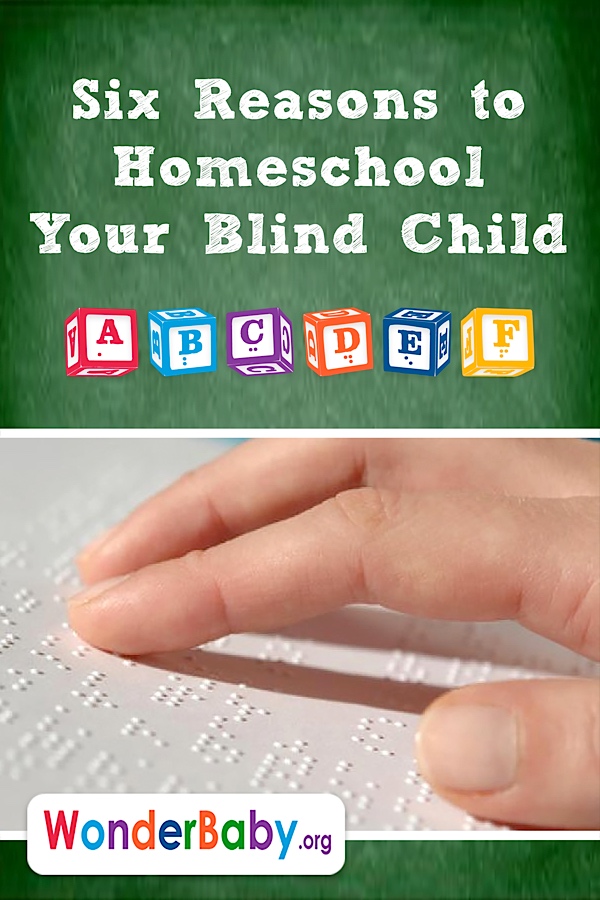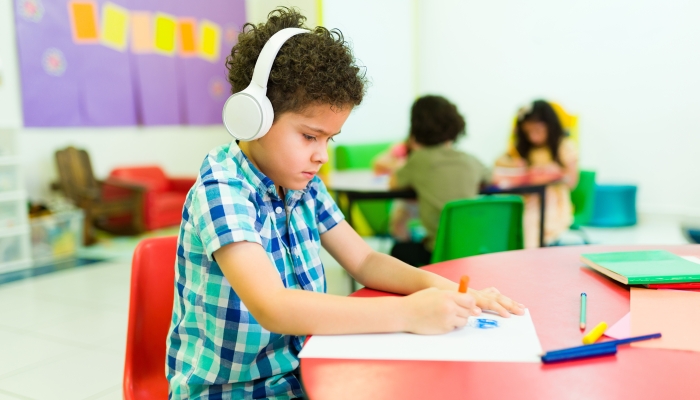Six Reasons to Homeschool Your Blind Child

I asked a group of parents who homeschool their visually impaired children to explain to me why they thought homeschool was the best option. Reprinted here is the wonderful response I received from one mom…
Dear Amber,
There are many reasons to homeschool your blind child. Here are six…
- You’re his MOM—no one else on earth can love him more than you do!
- You may not know much about blindness now, but you can learn. Start learning Braille now—he’ll only need the basic alphabet for his first few years, just like any child. The Hadley School for the Blind offers FREE (!) correspondence courses—and as a parent of a blind child, you qualify. By the time Ivan needs to learn Orientation & Mobility (such as cane skills & other navigational things), you can learn along with him. Just like how it will be for me when my children reach high school and are studying algebra…. I studied it in high school, but it was never my strongest subject (to say it nicely). Basically, I’ll be learning algebra along with them, except I’ll have the slight advantage of having gone through it once… 25 years earlier.What I’m trying to say is that you don’t have to be a blindness expert right now, any more than you have to know all the ins and outs of potty-training yet. When your son is 2 (or 3, or whenever) you’ll learn the things you need to know.
- I think homeschoolers in general have a more can-do approach to learning things. Rather than just trusting the school system to do it for you (and you may happen to get a good teacher or principal or two… but certainly not every teacher or principal for 13+ years!), you as a parent know you need to make it happen. You may “contract out” certain parts of your curriculum—like I may end up doing with my algebra example if I have a child with an engineer-smart brain—but you’ll still be in charge of your son’s education.
- No negative peer pressure, no other children or teens making fun of your son because he’s blind. For the positive peer pressure, join a local group for parents of blind children, or even for blind people in general. There are also summer camps for blind children where he can spend a week or so around other blind children, but then he can come back home to the best socialization—parents, siblings, and other mixed-age groups.
- You can customize your curriculum for your child. To me, this is one of the greatest benefits to homeschooling. In high school, I knew I wasn’t going to be a rocket scientist, a doctor/nurse, or any other highly specialized field. My primary “career” wish was to be a wife and mother (here I am!) and my secondary back-up career was and is computers, with apprenticeship or on-the-job training to be the most current in the field. So, I didn’t work too hard on algebra or science, because I knew those subjects weren’t going to be the core of my life’s work. However, my son could very well grow up to be an engineer. In that case, he’ll study extra science and math in high school, and just enough English and literature to have a well-rounded education. Or he could love history and want to be a history professor… in which case we’d go easy on the math and hit historyhard!I used high school as my example, but this starts even in elementary school. Perhaps Ivan will need extra help in reading in elementary school, so you wouldn’t have a separate course on health and safety for example… that sort of thing can be taught along the way in home life. It could be that in his early years, the only “subjects” he’d study would be Braille reading, math, and some sort of hands-on science stuff. History can be taught by you reading books aloud to him, etc. There’ll be plenty of time to catch up on the other stuff in junior & high school, after he has the basics down. A non-textbook-based curriculum like the Charlotte Mason approach may be easier to customize to a blind child.
- The #1 benefit to homeschooling is that you can pass along your family’s values to him. In a public school setting, you don’t know what he’s being taught in his classroom or on the playground. Even if you read the textbooks first, you don’t know what comments the teacher will make, so you’re at the mercy of whatever person the school district has hired, for better or for worse. Even if you have an awesome teacher—and I know there are some—children learn many not-so-nice things on the playground.At a residential school for the blind, you’ll be even less in touch with what he’s both learning and “catching” from those around him. Perhaps you’ll find a residential or day school will be a good fit when he’s 14… but that gives you 14 years to establish your family’s values in him before you send him off. You know, the greenhouse effect… shelter your tender little plant in the greenhouse of your home until he’s strong enough to face the outside weather on his own!
That’s all I can think of for now… of course I’m biased, being a homeschool student and graduate myself. We do plan to homeschool our children all the way through, blind or sighted or somewhere in-between. In fact, I’ve started home-pre-school with our oldest daughter, andshe loves it!
Good Luck!
For more information and support in homeschooling your blind child, check out the Blind Homeschooler Yahoo Support Group.

Related Posts

IEPs
5 Sample Self-Advocacy IEP Goals
Understanding the steps towards growing self-advocacy at school is an important part of building independence and self-efficacy for students.

IEPs
8 Sample Behavior IEP Goals
Find out how specific, measurable, and attainable behavior IEP goals help your child learn coping strategies and problem-solving skills, leading to more progress.

IEPs, Special Needs
Can AI Write My Student’s Next IEP?
While there are pros and cons, educators can use AI to help write a child’s IEP, streamlining the process.